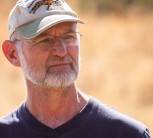UP researchers have been working on adapting the use of existing technology and testing it in the field to find an appropriate solution to mitigate complications arising from low oxygen levels during procedures like immobilisation. This new research improves our ability to provide care and ensure the well-being of rhinos in the field.

Dr Thembeka Mtetwa holds a BSc in Zoology and Human Physiology as well as an honours degree in Human Physiology from the University of Witwatersrand. She has been doing research at the University of Pretoria (UP) since 2016, when she started out as a National Research Foundation intern. Dr Mtetwa completed her MSc and PhD degrees through UP’s Department of Paraclinical Science in the Faculty of Veterinary Science.
She says that working in this faculty gave her the opportunity to learn about animal physiology, which she found fascinating. It started when she was doing her internship and continues to this day.
“Experiencing the research field as an intern without the added pressure of studying improved my curiosity and learning capacity,” Dr Mtetwa says.
Her research matters, she adds, because it expands our understanding of oxygen transport and oxygen utilisation in the body of not just humans, but other unique species that are able to cope in stressful conditions and with environmental stresses.
“I am interested in looking at the unique blood characteristics of different species, including mammals, birds and fish when exposed to different physiological stresses,” she explains. “My research provides insight into the cardio-respiratory function of different species and will contribute extensively to conservation efforts of endangered species.”
By understanding basic respiratory physiology of different species, Dr Mtetwa says her research will help answer applied research questions that have implications for human health and can help improve our understanding of how the human body reacts to different stresses.
“My research also aims to find ways to preserve the quality and shelf life of red blood cells to facilitate efficient oxygen transport studies of various species of South Africa, while minimising the costs and risks to animal health,” she adds.
As an early-career researcher and within her academic discipline, she would like to start an oxygen transport laboratory in the Department of Anatomy and Physiology at UP. She is initiating collaborative relationships with other research teams in her faculty, at the University of Witwatersrand and Aarhus University in Denmark.
Recent academic highlights for Dr Mtetwa was completing her PhD, establishing her research niche and starting a collaborative project with Aarhus University’s Zoophysiology Department. She will be visiting Aarhus University in the near future to learn laboratory skills and do research on oxygen transport in the white rhinoceros. These laboratory skills will help her to start her own research at UP.
There is more than one person who has inspired her in her research effort.
“Professor Leith Meyer has profoundly inspired me, and my journey in academia and science,” Dr Mtetwa says. “He is a professor, wildlife veterinarian and physiologist at UP and the Director of the Centre for Veterinary Wildlife Research. I first met Prof Meyer as my mentor when I was doing my internship in 2016. He embodies what a true mentor should be. He dedicated time to teach me and get to know me on a personal level. Because of his kindness, I took every opportunity to learn more about the academic and research field in the faculty. As a mentor, supervisor, friend and colleague, he reassured me of my potential despite my shortcomings. He continued to support my research interests and introduced me to some of the best people and scientists who I will work with for a long time to come.
“Another inspiring person is Prof Ned Snelling, a senior lecturer in the Department of Anatomy and Physiology. He’s been instrumental in shaping my academic career and continues to help me realise my full potential. His mentorship has not only equipped me with the skills and knowledge needed to excel in my role, but also instilled in me a lifelong appreciation for the transformative power of mentorship. I am deeply grateful for Prof Edward Snelling’s guidance, wisdom and friendship, and I am looking forward to paying it forward by empowering others in their own academic journeys.”
Yet another role model for Dr Mtetwa is Prof Tobias Wang, Head of the Department of Biology at Aarhus University, an extraordinary comparative physiologist and editor of the journal Acta Physiologica.
“His research is broad, from working on the physiology of the heart of different species, including the reptilian heart, to the digestion of snakes and oxygen transport of different species,” Dr Mtetwa explains. “The type of research he does is the same research I am interested in. Apart from his amazing reputation in science, he is an amazing human being who is fun, kind and passionate about supporting early-career researchers. Every time I listen to his talks, my eyes light up and I remember why I love science and why I want to be a comparative physiologist.”
Dr Mtetwa hopes to lead an oxygen transport laboratory, and mentor, supervise and inspire other female black scientists.
“Overall, I want to contribute significantly in the field of comparative physiology and contribute positively to medicine.”
Her advice to school learners or undergraduates interested in her field is to remember that the sky is not the limit.
“The only thing that will ever limit you is you,” Dr Mtetwa says. “Your success depends on the objectives you set for yourself. Secondly, science fosters creativity, imagination, curiosity and impact. If you want to live a happy and healthy life, live a life that allows you to continuously learn and make an impact in society – science does just that. Furthermore, if you want to succeed in this field, you need to understand that it is the journey that is important, not the destination. You’ll have to study for many years, so learn to be patient and find ways to enjoy the process, because you will see the results of your education only at a later stage. You should also be positive and kind, because that will help you meet the best people, who will have a significant impact on your life.”
Her hobbies include running, painting and attending concerts to listen to her favourite African soul and Afro-soul jazz artists like Bongeziwe Mabandla, Mandisi Dyantyis, Zoë Modiga and more.

Professor Leith Meyer has been doing research at the University of Pretoria (UP) for 12 years. He completed his undergraduate studies at UP’s Faculty of Veterinary Science in 2000, and joined the University of the Witwatersrand in 2003 as a lecturer in physiology. After two years, he was appointed as a research officer in Wits University’s Brain Function Research Group at the School of Physiology. During that time, Prof Meyer became particularly involved in the group’s research on wildlife environmental physiology and the consequences of game capture. In 2010, he obtained a PhD from Wits that focused on the reduction of the side-effects of capture.
Through his research, Prof Meyer aims to improve the welfare and conservation of various wildlife species. Within his academic discipline, he leads research that seeks a better understanding of the physiological consequences of veterinary management procedures, particularly when animals are captured, translocated, reintroduced into a habitat, rehabilitated or anaesthetised.
“Wildlife vets and managers play a key role in conservation programmes; my work helps these professionals to improve the health and welfare of wildlife species when they work with them,” Prof Meyer says. “My primary research interest and focus is to find novel ways of reducing the side-effects of wildlife capture, anaesthesia and translocation to improve animal health and welfare. We are working on several studies involving a number of different wildlife species, with a focus on rhinos.”
A recent highlight of his research was the discovery that one of the key drugs used to dart wildlife, especially rhinos, causes the activation of the animal’s stress pathways. This activation negatively affects these animals by making them hypermetabolic and hinders oxygen from entering their bodies through the lungs.
“We recently started a study to test novel drugs that can block these effects, with initial promising findings,” Prof Meyer explains. “We’re hoping to discover ideal drug combinations that can best prevent these adverse effects and make capture and anaesthesia safer for wildlife.”
He hopes that his work will have a positive impact on conservation, and improve the way in which wildlife vets handle and look after wild animals in the face of rapidly declining biodiversity. The changes in the world are making the conservation of nature challenging, with human interventions becoming more and more important, he adds.
Prof Meyer’s advice to school learners or undergraduates who are interested in his field is to stick to their dreams if they are passionate about becoming a wildlife vet and making a difference.
“It is an exciting and important field to be involved in, but hard work, dedication and commitment are required.”

Professor Edward Snelling did his undergraduate studies at the University of Adelaide, Australia and joined the University of Pretoria’s Faculty of Veterinary Science in February 2019.
His research is at the interface of experimental physiology, biomechanics and biochemistry. He uses models from Africa and Australia to study resting and locomotor energetics, respiratory and cardiovascular performance, muscle and skeletal systems, and thermoregulation in mammals, birds, fish, and insects. More information here -> www.edwardsnelling.com
 Story
Story
This edition is curated around the concept of One Health, in which the University of Pretoria plays a leading role globally, and is based on our research expertise in the various disciplines across healthcare for people, the environment and animals.
 Story
Story
Paediatric neurosurgeon Professor Llewellyn Padayachy, Head of the Department of Neurosurgery at the University of Pretoria’s (UP) Steve Biko Academic Hospital, is redefining how brain-related diseases are diagnosed and treated, especially in low-resource settings. He’s at the forefront of pioneering work in non-invasive techniques to assess and measure raised pressure inside the skull,...
 Infographic
Infographic
Africa faces immense challenges in neurosurgery, such as severe underfunding, a lack of training positions and a high burden of disease. There is one neurosurgeon per four million people, far below the WHO’s recommendation of one per 200 000. This shortage, compounded by the lack of a central brain tumour registry and limited access to diagnostics, severely impacts patient outcomes.
Copyright © University of Pretoria 2025. All rights reserved.
Get Social With Us
Download the UP Mobile App